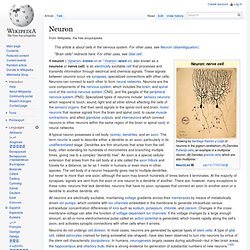

BrainFacts.org Homepage. Neuron. All neurons are electrically excitable, maintaining voltage gradients across their membranes by means of metabolically driven ion pumps, which combine with ion channels embedded in the membrane to generate intracellular-versus-extracellular concentration differences of ions such as sodium, potassium, chloride, and calcium.

Changes in the cross-membrane voltage can alter the function of voltage-dependent ion channels. If the voltage changes by a large enough amount, an all-or-none electrochemical pulse called an action potential is generated, which travels rapidly along the cell's axon, and activates synaptic connections with other cells when it arrives. Neurons do not undergo cell division. In most cases, neurons are generated by special types of stem cells.
A type of glial cell, called astrocytes (named for being somewhat star-shaped), have also been observed to turn into neurons by virtue of the stem cell characteristic pluripotency. Neuron viewed with an electron microscope. Neuron's cobweb-like cytoskeleton (its interior scaffolding) Instant Expert: The Human Brain - life - 04 September 2006 - New.